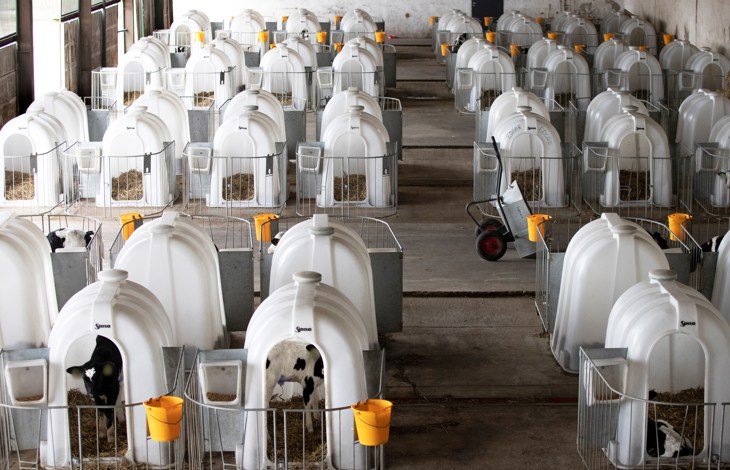Baby calves must not be kept in tight individual pens, confirmed scientists at the European Food Safety Authority (EFSA) in a new opinion published today. We welcome the recommendations that calves should be kept in groups and be allowed some contact with their mums, but we caution against a potential lack of ambition in the pending decisions on the future EU minimum standards, a draft of which is expected to be published later this year.
A life worth living?
The scientists state that calves should be housed “in pairs or small groups (2–7 calves) from the first week of life”. While mentioning that each calf should have at least 20m2 to have enough space to move around and play, EFSA is nonetheless very restrained with regards to its recommendations for minimum space allowances, suggesting 3m2 per calf as the “less preferable” option. We warn against this, however, as it would not be sufficient to give baby calves a life worth living.
EFSA also states that the mom and her baby calf should be allowed contact “during the whole pre-weaning period”; yet, at the same time, they recommend for a minimum standard that they should be kept together for at least one day.

Current conditions are cruel
“The conditions under which baby calves are kept in the EU are cruel," said Olga Kikou, Head of Compassion in World Farming EU. "Although they are social animals, they are separated from their mums as soon as they are born, then kept in isolation for about two months in very small spaces. EU scientists confirmed today that there is plenty of scientific evidence that calves suffer when isolated in cages. It is, however, eventually up to decision-makers to set the minimum standards, and we urge ambition.”
Separated and imprisoned
Every year, at least 9 million dairy calves across the EU are kept in small, individual pens with restricted social contact. A newborn calf is usually removed from his mother at a few hours old or immediately after birth. Separating the cow and her calf and confining the newborn in an individual pen causes great and prolonged distress to both. Under natural conditions, newborn calves lie together in groups whilst their mothers move off to graze. They form strong bonds which can last a lifetime.

EU law currently stipulates that calves may be removed soon after birth to be shut into an individual pen for up to 8 weeks. The European Commission, however, has committed to end the use of cages in animal farming, in response to the End the Cage Age campaign supported by 1.4 million Europeans, which Compassion in World Farming coordinated.
The background
As part of the legislative process to revise the EU animal welfare rules, the European Commission has mandated EFSA to produce a number of scientific opinions. It has already published scientific reports on laying hens, meat chickens, pigs, transport and relevant health-related risks, and we are still awaiting the publication of evidence for dairy cows, ducks, geese and quail.
For more information about our calls regarding the revision of the EU farmed animal legislation, please read our briefing. With regards to caged farming in particular, please see our report and scientific briefing.
Do not hesitate to email us at eu.office@ciwf.org